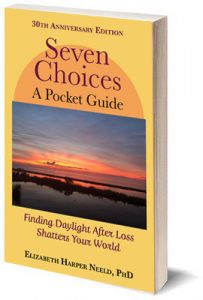
A carry-everywhere support guide to Seven Choices, summarizing the actions we can take and the positive choices we can make to reach equilibrium after an experience of change and loss.
Seven Choices offers hope, comfort, and advice to those experiencing change and loss– from the death of a loved one, the end of a marriage, or any life-altering change. In this pocket guide, Dr. Elizabeth Harper Neeld maps the complete grief, mourning, and change process, showing the reader how to identify and make the positive choices that allow movement through – and beyond – grief and loss.
Dr. Neeld summarizes her own personal story of life after the sudden death of her young husband. Interviews with others who have experienced change and loss are included. Each section of the pocket reference guide contains specific positive actions to take and choices to make that support an individual in moving through the process the preach the point where change is integrated into the fabric of one’s life.
Anyone who has experienced death, divorce, job or financial reversal, or any traumatic loss will want to keep this pocket guide handy.
60 pages (March 2018) Centerpoint Press; ISBN: 978-0937897218 $4.95 8
Excerpt ↓
Integration occurs when we experience that we are now released from the grip of the change event. No longer do we feel dominated by the loss; every day we are not forced to do combat with debilitating memories. Our life no longer is one gaping hole of emptiness and pain. We are stronger. We find that we are able now to grapple with those existential questions of loss. We experience release from the weight of the burden of grief. We enjoy an increased sense of play and freedom. We have a renewed interest in living; and, once again, when we look up, we can see a horizon. All of this is possible because we have chosen to experience fully the complete grieving process….
The women and men with whom I have talked speak of the release and new life that come during the experiences of integration.
SEEING THE GLASS AS HALF-FULL
A mother says:
I noticed people thought that since I had lost a young child who suffered seven years before she died that I would be very heavy and significant about life. But the truth is, through the pain I learned that you can be miserable anywhere you want to be and you can be happy anywhere you want to be. It’s what you make of yourself.
Once when I lived in Okinawa, it wasn’t the best living conditions, and there were wives there who were just miserable. They sat around all day being miserable. Well, anybody can be miserable. It doesn’t much of a person to be sad and miserable. It takes a heck of a person to make the best out of what’s the worse. When you go to the commissary and you want butter and they say, “Well, there’s no butter; there’s not going to be any butter for two weeks.” What do you do? You ask, “Well, do you have any whipping cream?” “Yes, we’ve got whipping cream.” So you buy whipping cream and make butter out of the whipping cream. Add a little salt and a little yellow food coloring, and you’ve go butter. That’s how you take life. That’s what life is. Whipping cream.
GAINING PERSPECTIVE
A widower says:
You’ve got to be able to see that this is some sort of learning process and that you don’t always know everything that is happening. It’s like the old Chinese story of the farmer whose champion stallion ran away and all the neighbors gathered to say, “That’s bad.” And the old farmer said, “Maybe.” The next day the stallion came back with a whole herd of wild horses, and the neighbors all said, “That’s good.” And the farmer said, “Maybe.” Then the farmer’s son broke his leg trying to tame one of the wild horses and the neighbors said, “That’s bad,” and the farmer said, “Maybe.” Right after the son broke his leg, the army came through and drafted all the young men and took them off to war, but they left the farmer’s son because his leg was broken. All the neighbors said, “That’s good,” to which the old farmer only said, “Maybe.”
And, of course, the story never ends. That illustrates to me that whatever is happening now, you don’t really know what is going on. And I’ve seen during these years of grieving for Dianne that this is true. It’s a real irony, isn’t it, that I would have ended up coming out of this thing an optimist!
 Order from Amazon
Order from Amazon
Reviews ↓
This is the best book I have ever read on grieving; and I have read many. This is the most empowering book I have ever used in working with grieving people; and I have worked with many.” – Bill Moore, National Trainer, AARP Widowed Persons Services
“Seven Choices is an affirmation of the power of the grieving process, a source of hope and validation. Dr. Neeld clearly goes well beyond a focus on coping (which is necessary) and acceptance to the importance of integration and self-empowerment.” –Dr. John Schneider, author, Stress, Loss and Grief
“Seven Choices is a profound book in many ways because the author really cares about people…deeply compassionate and very wise. This is a fine, sensitive book written by a very intelligent person. Extremely well done.” –The Coast Book Review Service, Fullerton, Ca.
“This is the best book on mourning since Judith Viorst’s Necessary Losses.” –Living Room Learning, Cultural Information Service
 Order from Amazon
Order from Amazon

 Buy From Amazon
Buy From Amazon